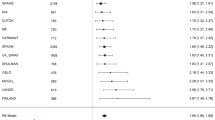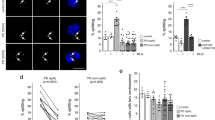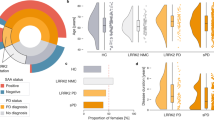Abstract
Mutations in the leucine-rich repeat kinase 2 gene (LRRK2) are the most common genetic determinants of familial and sporadic Parkinson’s disease (PD). Most of the mutational screenings analyzed the exon-coding sequence. Our aim was to determine whether LRRK2 3′ untranslated region (UTR) variants were associated with the risk of developing PD in a large cohort of patients (n=743) and controls (n=523) from Spain. We identified a total of 12 3′UTR variants (two new). Single-nucleotide polymorphism (SNP) rs66737902 C allele was overrepresented in patients (P=0.005; odds ratio=1.47). This SNP was in linkage disequilibrium with the p.R1441G mutation, but the association remained significant among mutation-negative cases. We found a significant lower level of the LRRK2 transcript in the Substantia nigra (SN) of PD postmortem donors (n=9) who were rs66737902 C carriers (P=0.01). This SNP was predicted to affect a binding site for miR-138-2-3p. We showed that this microRNA was expressed in all the SN samples. In conclusion, we found a significant association between SNP rs66737902 and the risk of developing PD. This effect on PD risk could be explained by differences in LRRK2 transcript levels between the two alleles.
Similar content being viewed by others
Log in or create a free account to read this content
Gain free access to this article, as well as selected content from this journal and more on nature.com
or
References
de Lau, L. M & Breteler, M. M Epidemiology of Parkinson's disease. Lancet Neurol. 5, 525–535 (2006).
Paisan-Ruiz, C, Jain, S, Evans, EW, Gilks, WP, Simon, J, van der Brug, M et al. Cloning of the gene containing mutations that cause PARK8-linked Parkinson's disease. Neuron 44, 595–600 (2004).
Healy, DG, Falchi, M, O'Sullivan, SS, Bonifati, V, Durr, A, Bressman, S et al. Phenotype, genotype, and worldwide genetic penetrance of LRRK2-associated Parkinson's disease: a case-control study. Lancet Neurol. 7, 583–590 (2008).
Rubio, JP, Topp, S, Warren, L, St Jean, PL, Wegmann, D, Kessner, D et al. Deep sequencing of the LRRK2 gene in 14,002 individuals reveals evidence of purifying selection and independent origin of the p.Arg1628Pro mutation in Europe. Hum. Mutat. 33, 1087–1098 (2012).
Seki, N, Takahashi, Y, Tomiyama, H, Rogaeva, E, Murayama, S, Mizuno, Y et al. Comprehensive mutational analysis of LRRK2 reveals variants supporting association with autosomal dominant Parkinson's disease. J. Hum. Genet. 56, 671–675 (2011).
Correia Guedes, L, Ferreira, JJ, Rosa, MM, Coelho, M, Bonifati, V & Sampaio, C Worldwide frequency of G2019S LRRK2 mutation in Parkinson's disease: a systematic review. Parkinsonism Relat. Disord. 16, 237–242 (2010).
Gonzalez-Fernandez, MC, Lezcano, E, Ross, OA, Gomez-Esteban, JC, Gomez-Busto, F, Velasco, F et al. Lrrk2-associated parkinsonism is a major cause of disease in Northern Spain. Parkinsonism Relat. Disord. 13, 509–515 (2007).
Cookson, MR The role of leucine-rich repeat kinase 2 (LRRK2) in Parkinson's disease. Nat. Rev. Neurosci. 11, 791–797 (2010).
West, AB, Moore, DJ, Biskup, S, Bugayenko, A, Smith, WW, Ross, CA et al. Parkinson's disease-associated mutations in leucine-rich repeat kinase 2 augment kinase activity. Proc. Natl Acad. Sci. USA 102, 16842–16847 (2005).
Lewis, PA, Greggio, E, Beilina, A, Jain, S, Baker, A & Cookson, MR The R1441C mutation of LRRK2 disrupts GTP hydrolysis. Biochem. Biophys. Res. Commun. 357, 668–671 (2007).
Sharma, S, Bandopadhyay, R, Lashley, T, Renton, AE, Kingsbury, AE, Kumaran, R et al. LRRK2 expression in idiopathic and G2019S positive Parkinson's disease subjects: a morphological and quantitative study. Neuropathol. Appl. Neurobiol. 37, 777–790 (2011).
Higashi, S, Biskup, S, West, AB, Trinkaus, D, Dawson, VL, Faull, RL et al. Localization of Parkinson's disease-associated LRRK2 in normal and pathological human brain. Brain Res. 1155, 208–219 (2007).
Devine, MJ, Kaganovich, A, Ryten, M, Mamais, A, Trabzuni, D, Manzoni, C et al. Pathogenic LRRK2 mutations do not alter gene expression in cell model systems or human brain tissue. PLoS One 6, e22489 (2011).
Gehrke, S, Imai, Y, Sokol, N & Lu, B Pathogenic LRRK2 negatively regulates microRNA-mediated translational repression. Nature 466, 637–641 (2010).
Cho, HJ, Liu, G, Jin, SM, Parisiadou, L, Xie, C, Yu, J et al. MicroRNA-205 regulates the expression of Parkinson's disease-related leucine-rich repeat kinase 2 protein. Hum. Mol. Genet. 22, 608–620 (2012).
Cardo, LF, Coto, E, de Mena, L, Ribacoba, R, Mata, IF, Menendez, M et al. Alpha-synuclein transcript isoforms in three different brain regions from Parkinson's disease and healthy subjects in relation to the SNCA rs356165/rs11931074 polymorphisms. Neurosci. Lett. 562, 45–49 (2014).
Wu-Chou, YH, Chen, YT, Yeh, TH, Chang, HC, Weng, YH, Lai, SC et al. Genetic variants of SNCA and LRRK2 genes are associated with sporadic PD susceptibility: a replication study in a Taiwanese cohort. Parkinsonism Relat. Disord. 19, 251–255 (2013).
Acknowledgements
We thank Dr Claire Troakes and the London Neurodegenerative Diseases Brain Bank for supplying all post mortem brain samples. We also thank the ‘Fundacion Parkinson Asturias’ and ‘Obra Social Cajastur’ for their support. This work was supported by grants from the Spanish ‘Fondo de Investigaciones Sanitarias-Fondos FEDER’ European Union (FIS 11/0093). LFC is a predoctoral fellowship from FICYT-Principado de Asturias.
Author contributions
All the authors contributed to this work by recruiting the patients and obtaining the clinical and anthropometric data or by performing the laboratory work. All authors have read and approved the submission of this manuscript.
Author information
Authors and Affiliations
Corresponding author
Ethics declarations
Competing interests
The authors declare no conflict of interest.
Additional information
Supplementary Information accompanies the paper on Journal of Human Genetics website
Supplementary information
Rights and permissions
About this article
Cite this article
Cardo, L., Coto, E., Ribacoba, R. et al. The screening of the 3′UTR sequence of LRRK2 identified an association between the rs66737902 polymorphism and Parkinson’s disease. J Hum Genet 59, 346–348 (2014). https://doi.org/10.1038/jhg.2014.26
Received:
Revised:
Accepted:
Published:
Issue date:
DOI: https://doi.org/10.1038/jhg.2014.26
Keywords
This article is cited by
-
Low Levels of LRRK2 Gene Expression are Associated with LRRK2 SNPs and Contribute to Parkinson’s Disease Progression
NeuroMolecular Medicine (2021)
-
MiRNA Profile in the Substantia Nigra of Parkinson’s Disease and Healthy Subjects
Journal of Molecular Neuroscience (2014)



